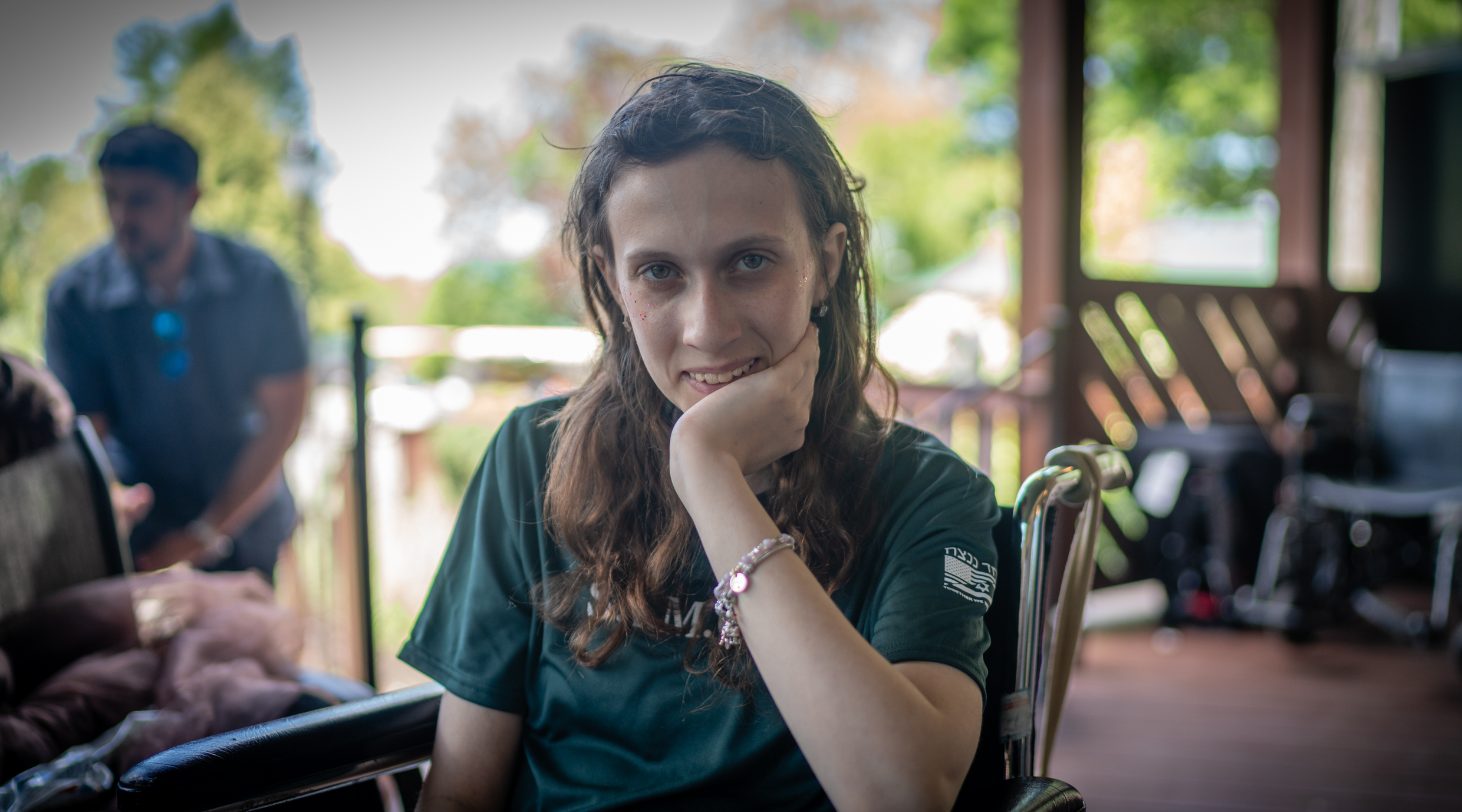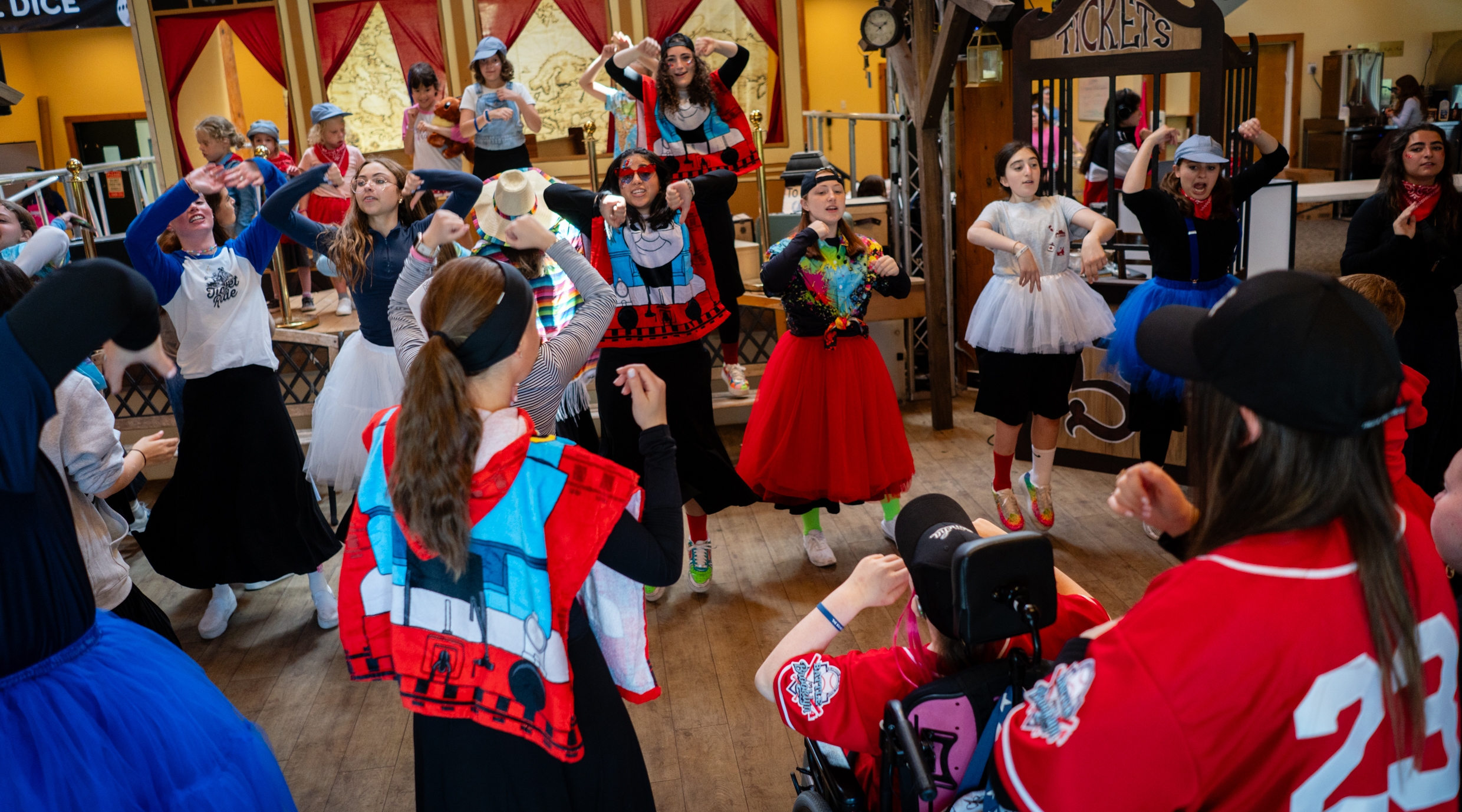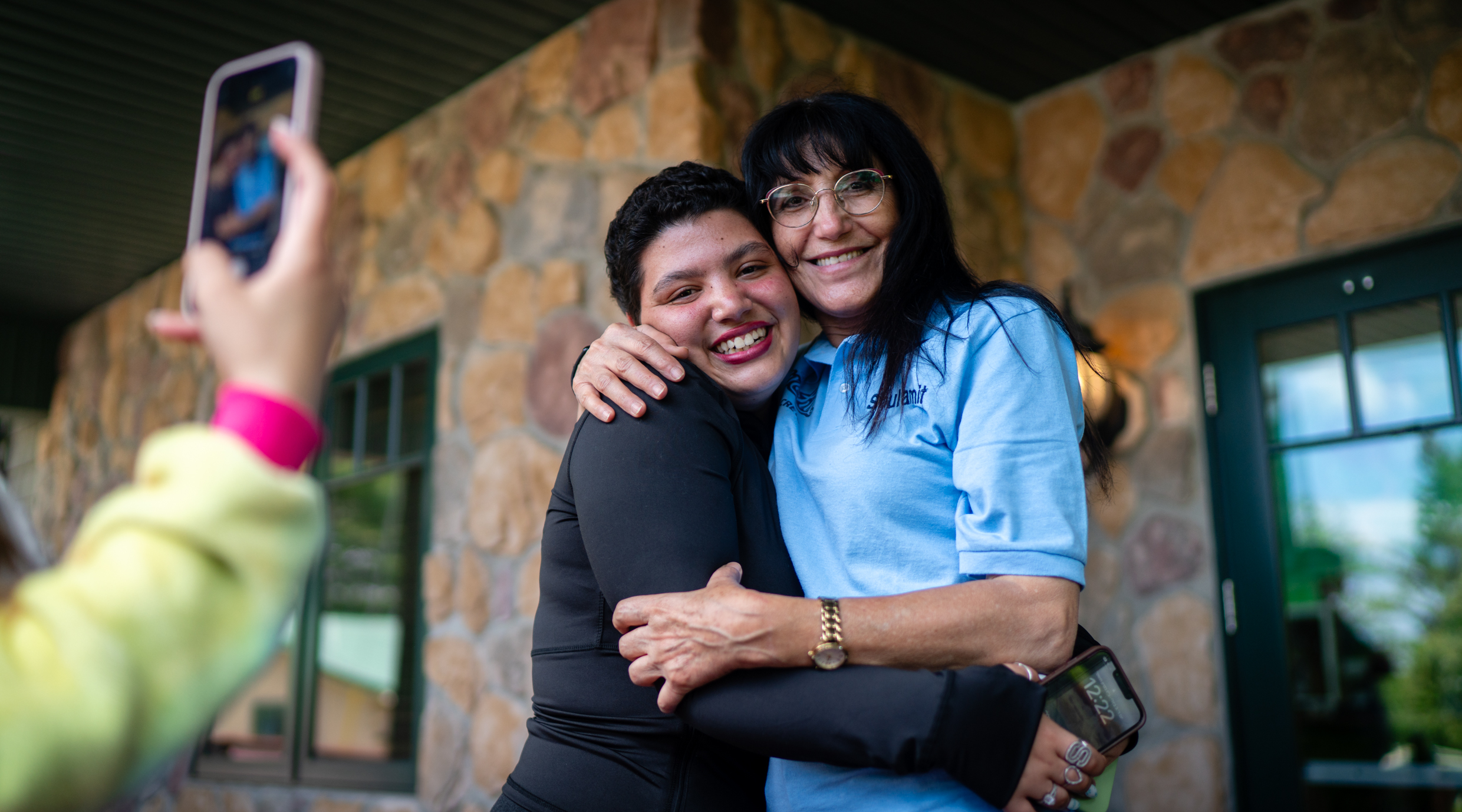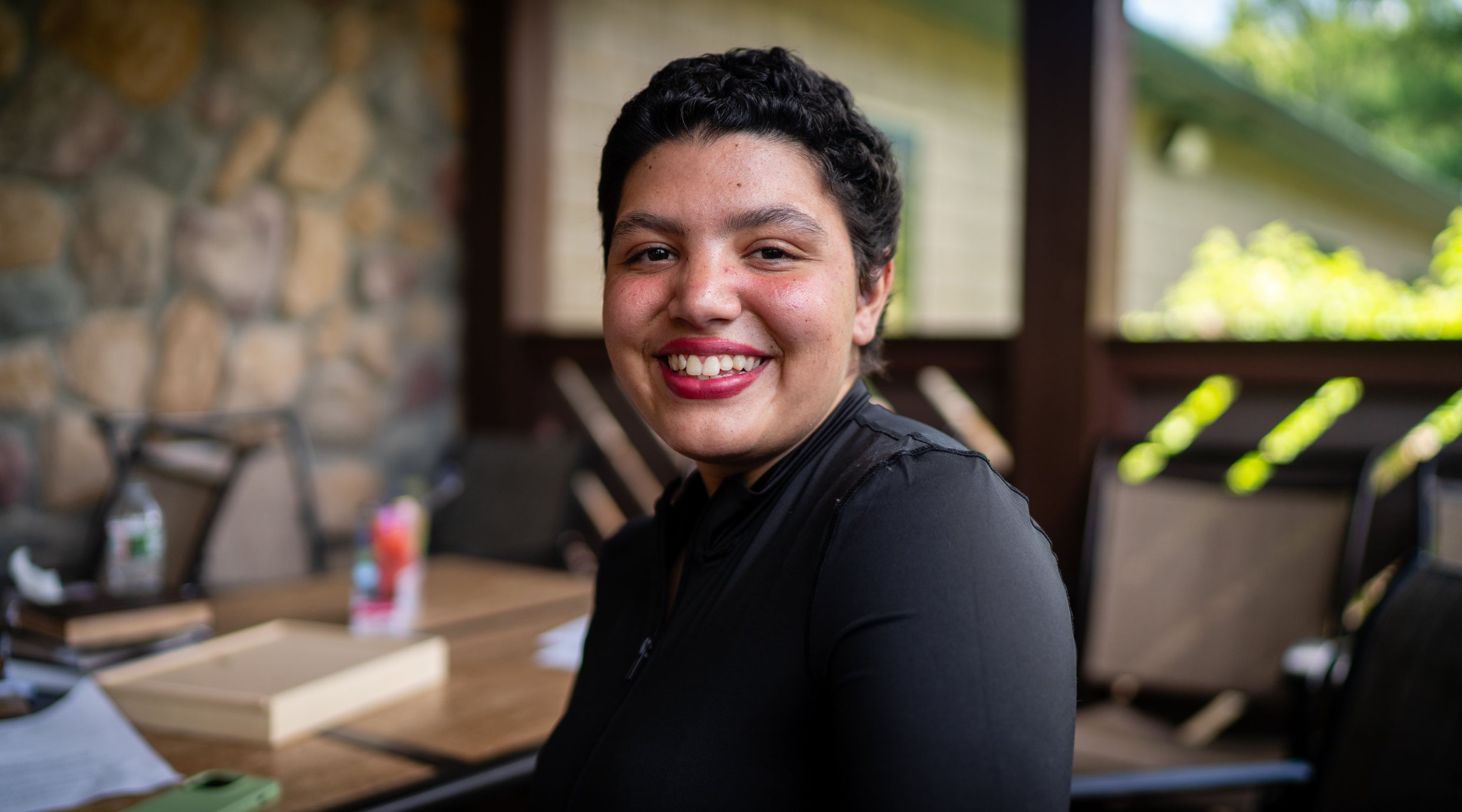GLEN SPEY, New York — Fifteen-year-old Shira Tshuva was diagnosed with cancer the week of Oct. 7. After the diagnosis, she had to make a three-hour trip every day from her home in northern Israel to receive treatment at Tel HaShomer Hospital outside Tel Aviv.
The shuttle service was disrupted by rockets fired by Hamas. While Tshuva was in hospital, the attacks from Gaza continued.
“While I was being treated, I ran to the security room with the entire medical team and prayed that no missile would fall on the hospital,” said Tshuva, who suffers from dysgerminoma, a rare form of ovarian cancer. “It’s not about dealing with one thing, but two things – both the cancer and the war.”
Tshuva was one of 28 Israeli children with serious illnesses who got a break from the conflict this month. They left Israel and moved to Camp Simcha, a Jewish summer camp in the Catskills for children with life-threatening or debilitating illnesses. It is not the first year the camp has hosted Israeli children, but this year, in the midst of war, Simcha hopes to give the Israeli children a respite that will help them recover.
“When they are here, they hardly think about the war,” says Shulamit Amar, an emergency room nurse in Israel who accompanied children, including Tshuva, to the camp while on vacation. “They don’t even want to watch the news, because this is the time when they can switch off.”
The camp is run by Chai Lifeline, a Jewish nonprofit based in New York City that supports sick or traumatized children. It is located in the rolling, wooded hills of upstate New York near the Delaware River and the Pennsylvania border. Four two-week courses are held between June and August, two for boys and two for girls. This summer, nearly 500 children ranging in age from elementary school to 20 are housed there. There were about 120 girls at the camp for the course Tshuva attended, said Scott Moerdler, a pediatric oncologist at the camp.
“They connect with each other not only as cancer patients, but also as Jews,” says Rivky Zuckerman, the senior counselor for girls.
“It really gives them that kick, that feeling of happiness, that joy that keeps them going,” Moerdler said.
The camp has a medical center that takes care of the children’s treatment and can perform everything except surgery. On a recent weekday, Moerdler stayed up late with a child receiving chemotherapy, who was listening to Israeli pop star Omer Adam and painting Moerdler’s nails to pass the time.
The camp tries to create a calm and welcoming atmosphere that matches the landscape outside. The infirmary — which has eight nurses, several doctors and specialists, including a respiratory therapist and a pharmacist — is decorated with idyllic murals of silos, hay bales and horses under a blue, cloudy sky. A door next to the nurses’ desk, with a painting of chickens in a pen next to it, leads to the camp’s “pharmacy.” Paramedics are on standby and a helicopter evacuation team works with the camp for emergencies.
Many of the employees are devout Jews, but religious laws restricting work and technology on Shabbat are suspended because Pikuach Nefeshthe Jewish commandment to save a life regardless of religious considerations, said Moerdler, who has worked at the camp for 19 years.
The Israeli campers traveled to New York last month with nurses from Israel and are receiving the same treatment as other children, but with special attention to possible post-traumatic stress disorder. For example, one song on the camp playlist included a siren sound that was jarring to Israeli children accustomed to running for cover on “red alerts” from missile warnings. The song was immediately removed from rotation.
Support New York Jewish Week
Our nonprofit newsroom relies on readers like you. Donate now to support independent Jewish journalism in New York.
Some of the Israelis who arrived in Simcha are traumatized by the rockets, others have parents at the front or family members who survived the October 7 attack.

“It makes me forget for a moment the situation in Israel and my father who is fighting in Gaza,” said Ella Shapira, an Israeli teenager spending part of the summer at Camp Simcha, July 3, 2024. (Luke Tress)
Ella Shapira, 19, left for the camp while her father, an army medic, was in Gaza and unable to communicate with his family.
“I was really scared that something might happen to him,” said Shapira, who was diagnosed with Hodgkin’s lymphoma, a blood cancer, five years ago. A few days after arriving at the camp, her father left Gaza unharmed.
Shapira said she had wanted to attend the camp for five years but was unable to due to health issues. She enjoyed the trips to a lake on campus the most.
“I go on boat trips, there is a lot of wind and a beautiful landscape that you can’t see in Israel,” said Shapira. “It makes me forget for a moment the situation in Israel and my father who is fighting in Gaza.”
Amar said the experience at Camp Simcha has “undoubtedly” become more meaningful for Israelis like her since Oct. 7. She lives near a hospital, has treated soldiers wounded in the war, and says the sound of helicopters landing near her home is a trigger for her.
“When a helicopter lands on the field, I cry. Every night when I hear them, I think, ‘Oh, there’s another family,'” said Amar. “The silence, the calm here, you don’t hear the explosions or the helicopters.”
The severity of the illness of the camp participants varies. From those who have completed cancer treatment to those who are cared for in a hospice. Some families send their children to camp in the last weeks of their lives.
But in addition to medical treatment, Simcha also wants to give the children the experience of a normal Jewish summer camp. Activities on offer include zip-lining, rock climbing and swimming. Arts and crafts classes are held in a building designed to look like a castle, with parapets and a portcullis at the entrance.
Camp participants visit a costume room at the start of the day and stroll around the grounds wearing pink cowboy hats, princess dresses and face paint. Some of the costumes one morning last week matched the session’s theme, which included board games such as Candy Land, Monopoly and Scrabble. At an event centered on the board game Battleship, many participants wore Israel Defense Forces T-shirts.

Campers and counselors dance after lunch at Camp Simcha, July 3, 2024. (Luke Tress)
After lunch, campers held a dance party on the cafeteria floor. Counselors led dance routines from a stage decorated with a replica train from the board game Ticket to Ride, in keeping with the day’s theme. Shapira posed for a photo in her wheelchair, looking out the train window, while counselors danced with children in train conductor uniforms on their shoulders. Other campers carried signs depicting the Rav Kav cards used to ride public transportation in Israel.
Nachman Maimon, the camp’s director, said some of the children spent much of their time outside the camp with adult health workers and lacked meaningful contact with other children.
Support New York Jewish Week
Our nonprofit newsroom relies on readers like you. Donate now to support independent Jewish journalism in New York.
“They don’t have friends their age. An eight-year-old needs eight-year-olds,” Maimon said, adding that the children’s fears came out in their conversations with each other, often while lounging in the hammocks that hang in the shade of the trees outside the cafeteria.
“They are afraid, their siblings are afraid,” he said. “Communities of children are formed here and they stay for years.”
Shapira said she has built a connection with the Americans, who are sympathetic to her father in Gaza and want to learn more about the conflict. She has also made contacts with other Israelis she did not know before the trip.
“It’s fun to meet new people who have had the same experiences as you because you can talk to them about a lot of things and they understand things that most people don’t understand,” she said.
Tshuva said she has drawn strength from the other campers and from Amar, who Tshuva calls almost every day.
“Shulamit, my nurse, means everything to me,” Tshuva said. “I can say, ‘Shulamit, come and listen to me,’ and she is always there.”

Shira Tshuva and her nurse Shulamit Amir in Camp Simcha, July 3, 2024. (Luke Tress)
In Israel, Tshuva returned to her home in the north after completing treatment at Tel HaShomer. Soon after, the conflict on the northern border escalated and Hezbollah began bombarding Israel with hundreds of rockets and drones. Tshuva was locked in her safe room at home and suffered panic attacks. The sounds of explosions and gunfire revived her fears from the videos of the Oct. 7 atrocities, she said.
While she was in the camp, her family prepared to evacuate their home if a full-scale war broke out in the north.
“They want to evacuate us from the village where I live because there is so much chaos there. Even the safe rooms are not enough. I think the camp takes me away from that reality,” she said.
But she also used her time at camp to deal with the worries she had in Israel. Her favorite activity was visiting a shooting range where the older campers shoot at targets.
“There’s no one around me,” she said. “And for a moment I can focus on my fear and try to overcome it.”




